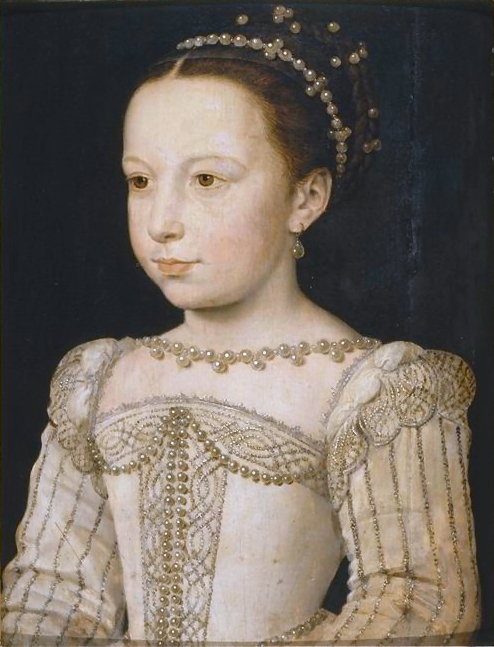 |
| By Francis Clouet via Wikimedia Commons |
Born at a turbulent time in French history, Marguerite was the sixth child of King Henry II and Catherine de Medici. She witnessed the dying days of the Valois monarchy and the violence of the Catholic-Huguenot wars, often from the very center of the conflict. By age 19, she had already lost her father in a freak jousting accident and her Italian-born, Machiavellian mother was firmly in control of her brother's throne. Marguerite already had a licentious reputation as the rumored mistress of one of princes of the House of Guise, the bitter rivals of her mother. True or not, the whispers were undoubtedly flamed by her regal brother, Henry III, with whom some allege she had an incestuous relationship while others say they deeply despised each other.
So, when it came time, to reconcile the Catholic Valois with the Protestant Navarre branch of the royal family, there was likely little familial remorse to sacrifice Marguerite to the Huguenot King Henry of Navarre. Amidst rumors that her mother had poisoned his mother, Queen Jeanne of Navarre, the wedding took place with the Protestant groom forced to stand outside of the cathedral. A few days later, with all of the highest-born Protestant still in town to celebrate the wedding, Marguerite's brother and mother (allegedly) unleashed the terror of the St. Bartholomew's Day Massacre, wiping out thousands of French Huguenots. Despite her own dislike for the husband she viewed as something of a country bumpkin, Marguerite protected him and others, saving them from death. They were both kept in Paris, more or less prisoners, for the next several years. Not an auspicious beginning for newlyweds.
Both King Henry of Navarre and his new Queen Marguerite were said to be unfaithful to each other and to argue incessantly. The relationship was so bad that, when he eventually returned to Navarre, he did not initially allow her to return, despite their dynastic need to create heirs. For the next several years, she bounced back and forth between her husband's and her brother's courts, not really wanted at either. She made the best of things, enjoying the best art, culture, and fashion that money could buy. She was a very early fashion leader, who undoubtedly would have enjoyed the attention garnered by today's tabloid princesses. Nevertheless, her romantic adventures even caused her brother to keep her under lock and key for awhile.
When her brother died in 1589, her husband succeeded him and she became Queen of France. The marriage had remained stormy and childless. Henry began annulment proceedings in 1592 and an annulment was finally granted in 1599. Marguerite was allowed to keep her queenly titles and was given a generous income that allowed her to maintain her many charitable activities for the poor and sponsorships of art and culture. She even eventually became close to her former husband and his new wife, Marie de Medici, and was a beloved figure in the lives of their children.
Nevertheless, scandal continued to follow her. (One of her young lovers murdered another young lover in her presence, so she had him beheaded.) It is no wonder that Shakespeare found ample inspiration when he wrote Love's Labour's Lost or that Alexandre Dumas' could dedicate to whole volumes of La Reine Margot to her fictionalized biography.
Biographies of Marguerite:
Book of Memoirs of Marguerite de Valois
Portrait of Power by Karin M. Armour
For more about Marguerite:
Appel a communication: Marguerite de Valois on ApAhAu
Female Protagonists Bridget Jones and Marguerite de Valois on A Dribble of Ink
A little gossip - Marguerite de France, Marguerite de Valois on It's About Time
Marguerite de Valois on Yelena Casale's blog
Marguerite de Valois, known as Queen Margot on Freda Lightfoot's blog
La Reine Margot and the death of her teenage gigolo lover on A World Elsewhere
Fictional depictions of Marguerite:
Film (fiction) depictions of Marguerite:
Books about Marguerite:
No comments:
Post a Comment